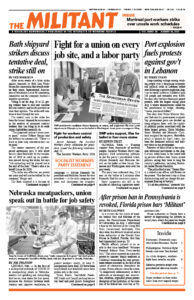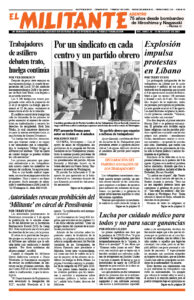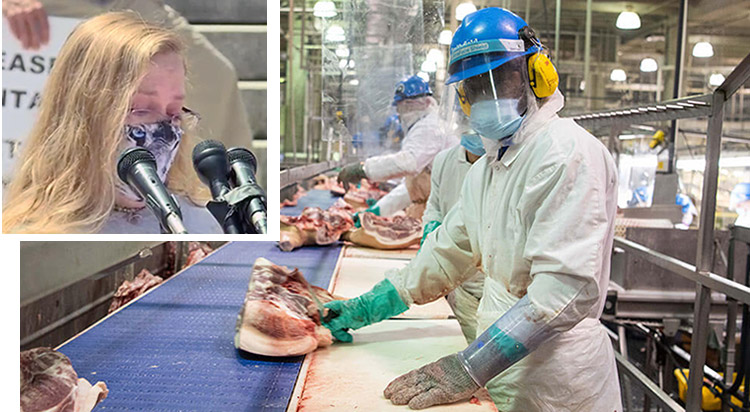LINCOLN, Neb. — In the face of a widespread outbreak of COVID-19 in meatpacking plants in Nebraska, workers are speaking out, demanding that bosses slow down the line speed, increase the distance between work stations and improve ventilation, to protect workers’ health. At least 21 meatpackers have died, 223 have been hospitalized and hundreds more have gotten sick in the state.
Tyson Foods, Smithfield Foods, JBS Smith and Cargill packing bosses run beef and pork plants throughout the state, and they claim they’re doing all they can. They’ve put up plastic screen dividers, take workers’ temperatures and send them home if they register too high, and give out masks.
“The measures that are put in place are to make the corporations look and feel good,” Geraldine Waller, a worker with 30 years at Smithfield Foods in Crete, told a July 28 rally on the steps of the state Capitol here, but do little to protect workers’ lives. The rally of 50 people included meatpackers, their families, officials of the Nebraska State AFL-CIO and other unions, and other supporters of workers’ rights.
“The company won’t slow the line down,” Waller said. “Many times we have to contact the union to get it back to workable speeds. We are human beings, not robots, and not disposable.”
Waller’s vivid description shows why workers at every plant need a union and to press for a fight for workers control of production and safety.
She noted that in the last 30 years the workforce at the Crete plant has nearly tripled to some 2,300 workers, but the physical workspace has only doubled. “The plant was overcrowded before COVID-19,” Waller said, with “hundreds of people working shoulder to shoulder.”
“Ventilation is horrible in the entire plant, with our locker rooms being the worst,” she said. In the summer they are “literally 110 degrees at 5:30 a.m. when we start work.”
Safety glasses “fog up, making it unsafe to work with knives and hooks,” she said. And the plastic dividers the company installed force workers to cut meat in a tight, confined space, “limiting our movement even more” and making work more dangerous.
A majority of meatpacking workers in Nebraska are Latino immigrants, as well as refugees from Myanmar, Somalia and South Sudan.
Nebraska state Sen. Tony Vargas — whose South Omaha district includes many meatpacking workers and the plants where they work — had tried to get a bill heard to impose more regulations on packinghouses. It didn’t make it to the floor of the legislature, but senators did agree to schedule a hearing for workers and others to testify on the issues. They limited attendance to 20 people at a time.
State Sen. Matt Hansen said the hearing would “be a start” that the legislature would address “at some point in the future.”
Workers say ‘things have to change’
On Aug. 6, over 40 meatpackers and others came down to testify at the Capitol about their working conditions.
“Nobody comes to replace face masks, because by 10 in the morning, the face mask is all wet and covered in blood,” meat plant worker Araizario Moreno told the hearing. She was fired from JBS Swift in Grand Island after being injured on the job.
Christian Munoz, who works at the Tyson plant in Dakota City, said he came to testify on behalf of his father, who had worked side by side with him on the line and who died of COVID-19.
Eric Reeder, president of United Food and Commercial Workers Local 293, which represents many of the state’s 20,000 meatpackers, told the hearing that meatpacking bosses have disciplined hundreds of its members for not being able to keep up with the way the bosses speed up the line.
“Two workers are expected to do the work that four used to do. The meat employers need to hire more workers, to slow down the line and put more distance between work stations,” Reeder said.
John Hansen, president of the Nebraska Farmers Union, told the committee “that the farm community wants workers protected for both economic and moral reasons,” and addressed the workers at the hearing, saying, “We are going to be with you to find a way to be sure your workplace is safe.”
This Militant worker-correspondent, a retired rail worker, a union member for 60 years and a member of the Socialist Workers Party, also spoke. I said that workers can’t rely on the government to ensure safe working conditions.
“Workers need to have the power to shut down production in face of any threat to safety,” I said. “We need to fight for workers control over production and safety. We need a union at every workplace.
“Work can be done safely, but only when workers are in charge of deciding what is necessary to stop the spread of coronavirus and injuries and deaths on the job. In the course of their fight, I believe we’ll need our own party, a labor party, to help lead this struggle,” I said, “and so we can fight to take political power out of the hands of the bosses and organize a workers and farmers government.”


